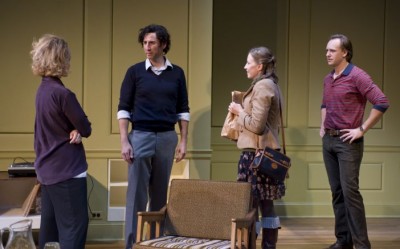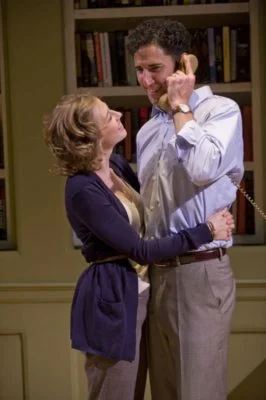The Real Thing
By Tom Stoppard
Directed by Michael Halberstam
At Writers’ Theatre
As railhead towns feel the steel mills rust
1982 was a heavy year: the unemployment and inflation of the 1970s remained unstaunched – the career opportunities that weren’t knocking in 1977 had turned into rusting steel mills in northern England – “clear as winter ice, this is your paradise.” The Clash, the quintessential British musical response to the acrid political and financial landscape, released Combat Rock that year, with the bitter “Know Your Rights” (“You have the right not to be killed. Murder is a crime unless it is done by a policeman or an aristocrat.”) and mournful “Straight To Hell” (“Can you cough it up loud and strong? The immigrants, they wanna sing all night long…. Ain’t no asylum here. King Solomon, he never lived ‘round here.”). There was anger at the government, at the rich, at the military. And it spilled onto the streets, it marched up to military bases, it sat and scowled at scabs crossing the picket lines. This was the backdrop to Tom Stoppard’s The Real Thing. This was Maggie Thatcher’s England.
 Which is not particularly about politics; it is not particularly about policy. It is really about people. Stoppard himself said, “I believe in art being good art or bad art, not relevant art or irrelevant art.” He does not make any grand political statements; he focuses on the individual. Henry (Sean Fortunato) is a playwright, finding commercial success with his latest, House of Cards, but everyone seems to think that his best is his earlier works (a sentiment Stoppard was experiencing himself at the time). The leads in his play are Max (John Sanders) and Henry’s own wife, Charlotte (Natasha Lowe). However, he’s fallen in love with Max’s wife, Annie (Carrie Coon), and she with him. And so we have simply a human story. A story of love and betrayal and reaffirmation and rebirth. Indeed, I could not help but think of Betrayal as I watched the events unfold on stage.
Which is not particularly about politics; it is not particularly about policy. It is really about people. Stoppard himself said, “I believe in art being good art or bad art, not relevant art or irrelevant art.” He does not make any grand political statements; he focuses on the individual. Henry (Sean Fortunato) is a playwright, finding commercial success with his latest, House of Cards, but everyone seems to think that his best is his earlier works (a sentiment Stoppard was experiencing himself at the time). The leads in his play are Max (John Sanders) and Henry’s own wife, Charlotte (Natasha Lowe). However, he’s fallen in love with Max’s wife, Annie (Carrie Coon), and she with him. And so we have simply a human story. A story of love and betrayal and reaffirmation and rebirth. Indeed, I could not help but think of Betrayal as I watched the events unfold on stage.
 But it is Stoppard’s characters that are so fascinating and really drive this play. Henry is clever, flippant, glib, but moreover an absolute romantic. He is obsessed with trite 60s pop music. He does not listen to the angry, populist, buzzsaw music of his day. He listens to sappy, romantic ballads from a better, simpler time, when there was a possibility that love, that “our energy would simply prevail. There was no point in fighting – on our side or theirs. We had all the momentum; we were riding the crest of a high and beautiful wave.” Henry doesn’t want to admit that the wave finally broke and rolled back; he’s never been to Las Vegas, he can’t see that high water mark. But he knows it is there just the same. Perhaps that’s why he finds the new kids, the nuclear arms protesters and rioters so distasteful: it’s almost cliché to him now.
But it is Stoppard’s characters that are so fascinating and really drive this play. Henry is clever, flippant, glib, but moreover an absolute romantic. He is obsessed with trite 60s pop music. He does not listen to the angry, populist, buzzsaw music of his day. He listens to sappy, romantic ballads from a better, simpler time, when there was a possibility that love, that “our energy would simply prevail. There was no point in fighting – on our side or theirs. We had all the momentum; we were riding the crest of a high and beautiful wave.” Henry doesn’t want to admit that the wave finally broke and rolled back; he’s never been to Las Vegas, he can’t see that high water mark. But he knows it is there just the same. Perhaps that’s why he finds the new kids, the nuclear arms protesters and rioters so distasteful: it’s almost cliché to him now.
 This is quite the opposite of Annie, who is a champion of Brodie (Ryan Hallahan), a Scotsman imprisoned for setting the wreath of the Unknown Soldier on fire – as a protest against the military, of course. He is the disenfranchised youth of that day: angry at the world, furious at the government, able to make seemingly unreasonable things sound reasonable. At one point, he says that the reason he’s gotten out of prison early is that the prison population is overrun. And of course, there’s some truth to that. His counterpart is Henry and Charlotte’s daughter, Debbie (Rae Gray), who is also rebelling and retrying the agenda of 60s liberation – but in a personal instead of political way. Monogamy, she says, is a prison, a construct that only reinforces unhappiness. But, as one who lived through the original movement, Henry contests that “Free love isn’t free.” She decides to go off with a traveling musician who is part of a circus. Well, at least he has a job. Charlotte is simply happy that Debbie no longer her responsibility; but Henry is livid, and Debbie won’t let him meet the boy for fear he’ll cause him to run away.
This is quite the opposite of Annie, who is a champion of Brodie (Ryan Hallahan), a Scotsman imprisoned for setting the wreath of the Unknown Soldier on fire – as a protest against the military, of course. He is the disenfranchised youth of that day: angry at the world, furious at the government, able to make seemingly unreasonable things sound reasonable. At one point, he says that the reason he’s gotten out of prison early is that the prison population is overrun. And of course, there’s some truth to that. His counterpart is Henry and Charlotte’s daughter, Debbie (Rae Gray), who is also rebelling and retrying the agenda of 60s liberation – but in a personal instead of political way. Monogamy, she says, is a prison, a construct that only reinforces unhappiness. But, as one who lived through the original movement, Henry contests that “Free love isn’t free.” She decides to go off with a traveling musician who is part of a circus. Well, at least he has a job. Charlotte is simply happy that Debbie no longer her responsibility; but Henry is livid, and Debbie won’t let him meet the boy for fear he’ll cause him to run away.
So it really is a play that is made up of people. It is Stoppard recapturing his humanity after playing with artifice and theatre for the past decade. It is a powerful and beautiful piece of art. And this production leaves one in that warm blanket felt after witnessing something psychically satisfying and exceptionally executed. Sean Fortunato is a whip; Carrie Coon a firecracker; and the remaining cast equally as strong. Natasha Lowe is heartbreaking; John Sanders is charming; Jordan Lane Shappell is a compelling youth, Ryan Hallahan lip-curling. And Rae Gray comes in, puts her work in, and proves once again why she’s filling roles in this town. Never mind the hype, it’s always bollocks.
Highly Recommended
Will Fink
Reviewed on 9.22.11
For full show information, visit TheatreInChicago.
At Writers’ Theatre, 325 Tudor Court, Glencoe, IL; call 847-242-6000 or visit www.writerstheatre.org; tickets $45-$55; performances Tues. & Wed. at 7:30, Thur. & Fri. at 8pm, Sat. at 4 & 8pm, Sun. at 2 & 6pm; running time 2 hours 15 minutes; through November 20th.


I have not checked in here for a while since I thought it was getting boring, but the last several posts are great quality
so I guess I will add you back to my daily bloglist.
You deserve it friend 🙂